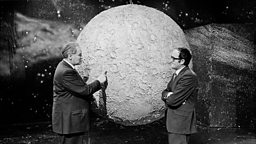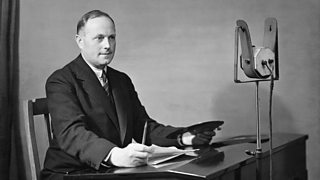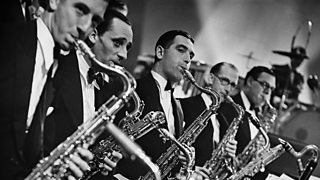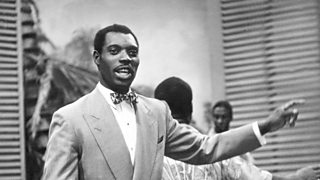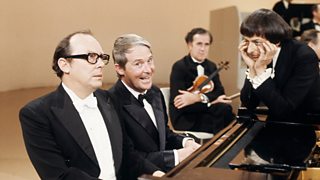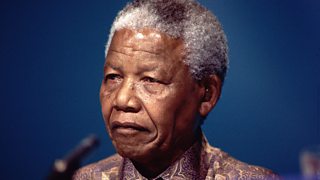The 1960s
With the 1960s comes pioneering electronic experimentation, with Stockhausen, Wendy Carlos and Delia Derbyshire forging bold new musical pathways. And, as Beatlemania takes hold, composers Luciano Berio, Benjamin Britten and Terry Riley develop similarly new musical languages.
We hear newsreel from the shocking assassinations of John F Kennedy and Martin Luther King Jr and, as the Space Race heats up, the USA has a shot at the Moon.
Listen on Radio 3 and 大象传媒 Sounds
-
![]()
Radio 3's Soundscape of a Century
Press rewind on a century of the 大象传媒 with an epic, eight-hour soundscape. Listen on 大象传媒 Sounds now (UK only).
The music
Works that define the spirit of the 1960s
- Benjamin Britten: War Requiem (1962)
- JS Bach arr. Wendy Carlos: Jesu, Joy of Man’s Desiring (1968)
- Karlheinz Stockhausen: Stimmung (1968)
- The Beatles: A Day in the Life (1967)
- Luciano Berio: Sinfonia (1968)
- Sam Cooke: A Change Is Gonna Come (1964)
- Edward Elgar: Cello Concerto (performed by Jacqueline du Pré at the 大象传媒 Proms in 1962)
- Ron Grainer (arr. Delia Derbyshire): Doctor Who Theme (1964)
- Ruth Gipps: Horn Concerto (1969)
- Aphrodite’s Child: Rain and Tears (1968)
- Krzysztof Penderecki: Three Pieces in Old Style (1963)
- Terry Riley: A Rainbow in the Curved Air (1969)
- Jean Sibelius: Pelléas and Mélisande (1905)
- Miles Davis, Gil Evans and Manuel de Falla: Will o’ the Wisp from Sketches of Spain (1960)
- Antonín Dvo艡ák: Cello Concerto (performed by Mstislav Rostropovich at the 大象传媒 Proms in 1968)
- György Ligeti: Cello Concerto (1967)
- Malcolm Arnold: Little Suite No 1 for Brass Band (1963)
1961
April: The first man in space
Soviet cosmonaut Yuri Gagarin becomes the first human to travel into space. His capsule, Vostok 1, completes one full orbit of the Earth before both it and Gagarin return to solid ground in the Soviet Union.

1962
May: Reconsecration of Coventry Cathedral
The 14th-century Gothic cathedral had been reduced to ruins by German bombers during the Blitz. Now, a new modernist cathedral designed by Basil Spence is to open in its place – not on the same site but next to the ruins, which are to be kept as a garden of remembrance and a symbol of reconciliation.
Benjamin Britten’s War Requiem, written to mark the occasion, premieres in the new cathedral a few days after its consecration. It combines traditional Latin Requiem texts with war poetry by Wilfred Owen, to devastating emotional effect.
Move him into the sun –
Gently its touch awoke him once,
At home, whispering of fields unsown.
Always it woke him, even in France,
Until this morning and this snow…
Watch a 1964 performance of Britten’s Requiem on 大象传媒 iPlayer.
August: Jacqueline du Pré’s Proms debut
Seventeen-year-old cellist Jacqueline du Pré is the soloist in Elgar’s Cello Concerto in what becomes one of the most famous performances of the century. Though the piece has been performed more than 25 times at the Proms between 1919 and 1962, it still doesn’t have widespread recognition with audiences. Until tonight.
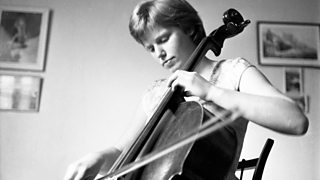
The audience is captivated by du Pré’s youthful passion and talent in what becomes an iconic moment for the Proms. She becomes a Proms audience favourite, performing in six seasons during the 1960s. She dies tragically young, aged just 42, of multiple sclerosis.
1963
October: Beatlemania
The Beatles have been growing in popularity throughout 1963, and in October the press coins the term “Beatlemania” to describe the scenes of hyper-enthusiastic fandom that attend their performances. The band is on the cusp of international superstardom: screaming crowds greet their plane when they touch back down in London after a US tour in 1964.
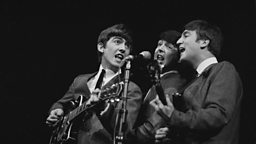
November: Doctor Who comes to TV screens for the first time
On 23 November, the day after the assassination of John F Kennedy, . At first overshadowed by current events, the new show gains momentum and by the time the Daleks make an appearance in December, the nation is hooked.
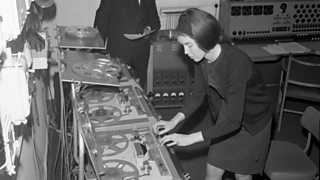
One of the things that makes the series so iconic is its catchy, otherworldly theme tune. The melody is written by Ron Grainer, but it’s Delia Derbyshire of the 大象传媒 Radiophonic Workshop who is responsible for its striking electronic arrangement, achieved years before synthesisers became widely available. When Grainer hears the theme for the first time, he reportedly has to ask if he really wrote it. Derbyshire modestly replies: “Most of it…”
1966
July: The final of the 1966 World Cup
The 大象传媒 and ITV pool their resources to broadcast the 1966 World Cup competition in detail. The final between England and West Germany is televised live on 30 July.
Match commentary by the 大象传媒’s Kenneth Wolstenholme culminates with the immortal words: “Some people are on the pitch! They think it's all over! It is now!”
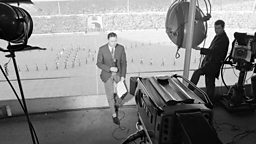
1968
April: Assassination of Martin Luther King Jr
On 4 April, the American civil rights activist Dr Martin Luther King Jr is shot dead in Memphis, Tennessee, by James Earl Ray. It’s yet another violent death in a turbulent decade for the USA, coming after the assassinations of John F Kennedy and Malcolm X in 1963 and 1965 and just two months before the assassination of Robert F Kennedy in June 1968.
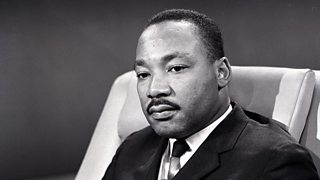
Italian composer Luciano Berio, working in the USA, is so affected by King’s death and the unrest that follows that he writes a piece in response, dedicated to King, that becomes the second movement of his groundbreaking Sinfonia. Seemingly disparate syllables are passed around eight amplified voices, accompanied by orchestra, until a name is clearly heard: Martin Luther King. Sinfonia would become one of Berio’s most famous works, receiving its UK premiere at the 大象传媒 Proms in 1969.
May: May 68 – France’s student protests
1968 is a year of protests for the entire world, as populations around the globe rebel against the old order. When the police crack down hard on student protesters in France in May, it sparks a wave of sympathy strikes that cause widespread disruption and threaten to bring the French economy to its knees.
Rain and Tears, a song by the Greek band Aphrodite’s Child, becomes a huge hit that summer.
August: The invasion of Czechoslovakia
The USSR State Orchestra’s appearance at the 大象传媒 Proms on 21 August could not come at a less opportune time. It’s the day after the USSR has invaded Czechoslovakia and Soviet tanks are rolling into Prague as Russian cellist Mstislav Rostropovich takes to the stage in London – to perform a work by a Czech composer, Antonín Dvo艡ák.
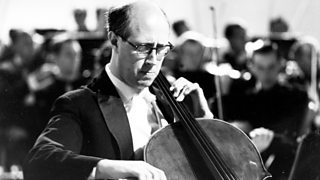
The audience starts booing the orchestra almost immediately, shouting “Go home!” and “Russians out!”. But Rostropovich’s performance changes the mood. The cellist weeps as he plays Dvo艡ák’s music, making all too clear the depth of his anger and sadness. At the end of the performance, he holds the score in the air as a gesture of solidarity with the Czech people.
October: Release of Switched-On Bach
US composer Wendy Carlos brings synths (and classical music) to a mass audience with Switched-On Bach, an album of music by Baroque composer JS Bach performed on a Moog synthesiser. The album sells over a million copies and is the second ever classical album to go platinum. Brian Wilson of the Beach Boys describes it as “one of the most electrifying albums I ever heard”.
July: The Moon landings
On 20 July, the USA’s Apollo 11 becomes the first manned spacecraft to land on the Moon and Neil Armstrong the first human to walk on its surface. It is the culmination of years of technological innovation and of an epic, Cold War space race between the USA and USSR.
The 大象传媒 is there every step of the way, even unveiling a shiny new 大象传媒 Space Studio in May 1969 to report on the progress of the previous Apollo 10 mission. Find out more about the 大象传媒’s coverage of the space race with 大象传媒 Archives.
